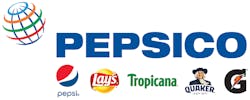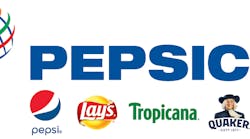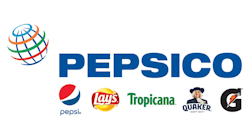PepsiCo Accelerates Plastic Waste Reduction Efforts
Source PepsiCo, Inc.
PURCHASE, N.Y., Sept. 13, 2019 /PRNewswire/ -- PepsiCo, Inc. (NASDAQ: PEP) today announced a new target to reduce 35% of virgin plastic content across its beverage portfolio by 2025, which equates to the elimination of 2.5 million metric tons of cumulative virgin plastic. Progress will be driven by the company's increased use of recycled content and alternative packaging materials for its beverage brands, including LIFEWTR®, bubly™ and Aquafina®, which recently announced sustainable packaging efforts.
Additionally, through the expansion of PepsiCo's SodaStream® business, an estimated 67 billion plastic bottles will be avoided through 2025. These targets advance PepsiCo's sustainable packaging vision and reinforce its "Beyond the Bottle" strategy which, in addition to SodaStream, includes the mobile-enabled Hydration Platform and other offerings that deliver beverages without single-use plastic bottles.
"While our efforts are far from done, this is one more step in PepsiCo's journey toward helping to build a world where plastics need never become waste," said PepsiCo Chairman and CEO, Ramon Laguarta. "Even as we work to accelerate business growth, we continue to make important progress toward a circular economy for packaging, a responsibility we take very seriously."
PepsiCo's sustainable plastics vision is rooted in three pillars: Reducing the amount of plastics used, Boosting recycling rates, and Reinventing plastic packaging.
"We're intentionally setting ambitious goals to drive meaningful progress," said Simon Lowden, President, PepsiCo Global Foods, who leads PepsiCo's Plastic Agenda. "PepsiCo is already one of the world's largest buyers of recycled plastic, and if there was more available, we'd buy it - and if there were more markets where we could use it, we would. We are committed, and partnership is key."
Today's announcement builds upon the company's already announced packaging goals to, by 2025: make 100% of its packaging recyclable, compostable, or biodegradable; and increase its use of recycled content in plastics packaging to 25%. Examples of PepsiCo's progress in sustainable packaging include:
- PepsiCo's premium water brand LIFEWTR will be packaged in 100% rPET (recycled polyethylene terephthalate) in the U.S., as the company's Naked Juice brand currently is, and bubly will no longer be packaged in plastic, starting in 2020.
- Aquafina will begin offering aluminum can packaging in U.S. foodservice outlets, while the brand tests the move in retail, starting in 2020.
- In select locations across Latin America and Asia, brands like Pepsi®, 7UP® and Mirinda® offer consumers refillable plastic and glass bottles.
- In Western Europe, Tropicana® relaunched using 50% rPET bottles and aims to reach 100% rPET by 2025.
The targets announced today are based off a 2018 baseline. In 2018, PepsiCo's total virgin plastic volume use was 2.2 million metric tons. For more information on PepsiCo's packaging goals and progress, visit: https://www.pepsico.com/sustainability/packaging
Visual assets can be downloaded by visiting https://www.pepsico.com/news/media-resources/media-downloads.
About PepsiCo
PepsiCo products are enjoyed by consumers more than one billion times a day in more than 200 countries and territories around the world. PepsiCo generated more than $64 billion in net revenue in 2018, driven by a complementary food and beverage portfolio that includes Frito-Lay, Gatorade, Pepsi-Cola, Quaker and Tropicana. PepsiCo's product portfolio includes a wide range of enjoyable foods and beverages, including 22 brands that generate more than $1 billion each in estimated annual retail sales. Guiding PepsiCo is our vision to Be the Global Leader in Convenient Foods and Beverages by Winning with Purpose. "Winning with Purpose" reflects our ambition to win sustainably in the marketplace and embed purpose into all aspects of the business. For more information, visit www.pepsico.com.
Forward-Looking Statements
Statements in this communication that are "forward-looking statements" are based on currently available information, operating plans and projections about future events and trends. Terminology such as "aim," "anticipate," "believe," "drive," "estimate," "expect," "goal," "intend," "may," "plan," "project," "strategy," "target" and "will" or similar statements or variations of such words and other similar expressions are intended to identify forward-looking statements, although not all forward looking statements contain such terms. Forward-looking statements inherently involve risks and uncertainties that could cause actual results to differ materially from those predicted in such statements. Such risks and uncertainties include, but are not limited to: changes in demand for PepsiCo's products, as a result of changes in consumer preferences or otherwise; changes in laws related to the use or disposal of plastics or other packaging of PepsiCo's products; changes in, or failure to comply with, applicable laws and regulations; imposition or proposed imposition of new or increased taxes aimed at PepsiCo's products; imposition of labeling or warning requirements on PepsiCo's products; PepsiCo's ability to compete effectively; political conditions, civil unrest or other developments and risks in the markets where PepsiCo's products are made, manufactured, distributed or sold; the ability to protect information systems against, or effectively respond to, a cybersecurity incident or other disruption; increased costs, disruption of supply or shortages of raw materials and other supplies; business disruptions; damage to PepsiCo's reputation or brand image; loss of, or a significant reduction in sales to, any key customer; disruption to the retail landscape, including rapid growth in hard discounters and the e-commerce channel; climate change or water scarcity, or legal, regulatory or market measures to address climate change or water scarcity; and other factors that may adversely affect the price of PepsiCo's publicly traded securities and financial performance. For additional information on these and other factors that could cause PepsiCo's actual results to materially differ from those set forth herein, please see PepsiCo's filings with the Securities and Exchange Commission, including its most recent annual report on Form 10-K and subsequent reports on Forms 10-Q and 8-K. Investors are cautioned not to place undue reliance on any such forward-looking statements, which speak only as of the date they are made. PepsiCo undertakes no obligation to update any forward-looking statements, whether as a result of new information, future events or otherwise.









